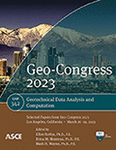Beginning to Develop and Assess Engineering Judgment in an Introductory Geotechnical Engineering Course
Publication: Geo-Congress 2023
ABSTRACT
Geotechnical engineering requires the application of engineering judgment to successfully interpret field conditions and come to an appropriate decision. To practice engineering judgment, engineers evaluate their initial impressions when presented with new information and learn from past failures. This much is implicitly understood, but how engineers accrue engineering judgment is highly debated and is a research area still in its adolescence. Members of industry posit that engineering experience is essential for competent engineering practice, but traditional engineering education practices need to be updated with opportunities to acquire such experience. Internships help some students obtain relevant experience that entry-level engineers need. Unfortunately, not all students have the opportunity to experience hands-on internships, especially during the pandemic. Defining engineering judgment in the context of practicing engineering does not always map to a useful tool for educators to generate curricular designs that target development of this skill in the classroom. This prompted the need for a new paradigm regarding engineering judgment in undergraduate learning. Using a qualitative systematic review, we identified an emergent theoretical framework for engineering judgment that is comprised of seven emergent competencies. This paper presents the use of this emergent framework to design, implement, and assess a design project in a sophomore-level introductory geotechnical engineering course at a small private research institute in the Northeast of the United States. If we want students to learn the competencies included within engineering judgment, we need an explicit definition. If we want to support faculty as they respond to evolving ABET criteria, we need evidence of the use of these assessment tools for a range of student products. This paper presents the use of a research-based instructional strategy for utilizing student-centered goals, activities, products, and assessments (GAPA) aimed at developing engineering judgment in an undergraduate classroom.
Get full access to this article
View all available purchase options and get full access to this chapter.
REFERENCES
AAAS (American Association for the Advancement of Science). (2019). Levers for Change: An assessment on changed STEM instruction. Report prepared by Sandra Laursen.
ABET. (2020). Criteria for accrediting engineering programs, 2019-2020. Retrieved November 18, 2020 from <https://www.abet.org/accreditation/accreditation-criteria/criteria-for accrediting-engineering-programs-2019-2020>.
Atman, C., Adams, R., Cardella, M., Turns, J., Mosborg, S., and Saleem, J. (2007). Engineering Design Processes: A Comparison of Students and Expert Practitioners. J. of Eng. Ed., October.
Bandura, A. (1977). Self-efficacy: Toward a Unifying Theory of Behavioral Change. Psychological Review. 84 (2): 191–215.
DiBiagio, E., and Flaate, K. (2000). Ralph B. Peck, engineer, educator, a man of judgement. Norwegian Geotechnical Institute.
Eder, W. (1995). Introduction to Engineering Design – based on Design Science. Fourth World Conference on Engineering Education October 15-20, 1995.
Facione, P. A. (1990). Critical thinking: A statement of expert consensus for purposes of educational assessment and instruction. The California Academic Press.
Facione, P. A. (2013). Critical thinking: What it is and why it counts. Measured Reasons and The California Academic Press.
Gainsburg, J. (2007). The Mathematical Disposition of Structural Engineers. Journal for Research in Mathematics Education, Vol. 38, No. 5.
MacRobert, J. (2018). Introducing Engineering Judgment through Active Learning. Journal of Professional Issues in Engineering Education and Practice.
Reynolds, T. (1992). The Education of Engineers in America before the Morril Act of 1862. History of Education Quarterly, Vol. 32, No. 4.
Richtarek, A. (2021). Beginning to Develop and Assess Engineering Judgment through Mixed Reality Game-Based Learning. Masters Thesis, RPI, Troy, NY.
Romkey, L., and Cheng, Y. L. (2009). The development and assessment of critical thinking for the global engineer. 2009 ASEE Annual Conference & Exposition.
Stolk, J., and Martello, R. (2018). Reimagining and Empowering the Design of Projects: A Project-Based Learning Goals Framework. 2018 Frontiers in Edu. (FIE) Conference.
Wulf, W. (1998). The Urgency of Engineering Education Reform. The Bridge, Vol. 28, No. 1.
Information & Authors
Information
Published In
History
Published online: Mar 23, 2023
Authors
Metrics & Citations
Metrics
Citations
Download citation
If you have the appropriate software installed, you can download article citation data to the citation manager of your choice. Simply select your manager software from the list below and click Download.
